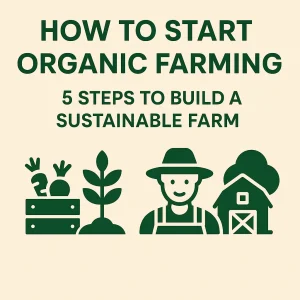 Organic food is a domestic choice nowadays. It is one of the world's movements that has changed peoples history about health, sustainability, and society. Step into perfect memories, and you'll see eco-conscious families with their children washing freshly-grown produce carefully. Visit this trendy farm-to-table restaurant, see menus boasting of the organic farms from which the ingredients come. Even the major grocery chains are dedicating entire aisles to organic options, showing just how mainstream the demand has become.
Organic food is a domestic choice nowadays. It is one of the world's movements that has changed peoples history about health, sustainability, and society. Step into perfect memories, and you'll see eco-conscious families with their children washing freshly-grown produce carefully. Visit this trendy farm-to-table restaurant, see menus boasting of the organic farms from which the ingredients come. Even the major grocery chains are dedicating entire aisles to organic options, showing just how mainstream the demand has become.
This surge in demand is by no means a fluke; people wise up these days-much more than before- about what goes into their food. They read labels, question farming practices, as well as putting their hard-earned money into chemical-free, responsibly grown produce. Farmers have a windfall of opportunity: they may make a living, but they also become part of a movement which stands to make a healthier lifestyle promise and a healthier planet.
But here lies the problem: Starting an organic farm is exceedingly daunting. Perhaps, you have been working traditional farming ways and wondering how to transition to organic. Or, perhaps, you have always wanted to own one piece of land, do something sustainable, but you don't know how to do it. The good news is organic farming doesn't have to be whatever a subject can make it. The right roadmap can make it simple.
That is precisely what this guide is about. We're taking you through five pragmatic steps in setting up and growing a successful organic farm. You'll learn how to:
- Strong soil health-build the foundation of organic farming.
- Confidently navigate the process of certification requirements.
- Let the ecologically aware, quality-conscious buyer find their way to your farm products.
- Combine modern tools like e-commerce platforms and the best web hosting in Canada for organic farming websites to take your business online.
- Building on years into your farm's well-thought-out, enduring combination of sustainability with profitability.
This guide is tailored toward helping everyone, whether transitioning toward organic practices or beginning fresh with new land, to put up and maintain a farm that has a very green leaf. Because organic farming isn't only about producing food-it's about creating a future where agriculture heals the earth instead of harming it, connects farmers directly with their communities, and ensures that healthy, sustainable food is accessible to all.
Consider this your sign if you have been waiting for that moment to bring you to organic farming. We can roll up our sleeves and dig into the five steps that will help you turn your vision into a thriving, sustainable reality.
Reasons Why Most People Have Transitioned to Organic Farming
Transitioning to organic farming will affect not only changes in the way you grow, but molding also how you, in the future, do business and relate to your land, customers, and even yourself. It is possible that such change might seem daunting initially, with decreases in yield, the mountain that certification can appear to be, and intimidating costs in the early years. The most important point is this: the long-term rewards-the environmental, health, and monetary ones-will always far outweigh the temporary drawbacks. What you are investing into when going organic is not just a farm-the return is also generally seen in healthier soils, communities, and a healthier bottom line.
- Environmental Benefits : Organic farming does work with nature, and it restores balance instead of depleting available resources. While adding loads of organic materials to soils, crop rotation, composting, and cover cropping allow for biodiversity improvement and collation for natural pest deterrents. Organic systems save water and reduce pollutants in their activities against thriving ecosystems rather than making them degraded. Yet, most importantly, it contributes to more carbon storage in the soil making that farm part of the global struggle against climate change. Thus, every organic harvest is a small step to healing the planet.
- Healthier and Safer Food : Organic fruits and vegetables are not simply free from pesticides; it is fresh food that you can feel good about consuming with your family and providing to the community. Since chemical pesticides and synthetic fertilizers are not used to grow crops, they are naturally safer, richer in nutrients, and bursting with real tastes. It is also well understood by all customers. They are not, though, merely buying vegetables or cereals; they are buying peace of mind and the story of how this specific product was raised. That trust gives your farm a powerful edge in today's conscious marketplace.
- Profitable in the Long Run : Yes, going organic means incurring some initial costs-soil amendments, certifications, time and effort for learning new systems, and so forth. But this is the reward: there will be less and less need for costly chemical inputs as demand and price for certified organic products rise. For model farmers, organic branding engendered loyalty and repeat sales, as well as funneled premium markets-both from farm-to-table partnerships and directly-to-consumer boxes, or e-commerce platforms.
5 Steps to Build a Sustainable Farm
Step 1: Understand the Principles of Organic Farming
Before planting, understand why organic farming has its philosophy. Such thinking makes a difference with conventional farming. Rather than using quick fix, synthetic input solutions to problems, the focus is on ecological balance in the long term.
What Makes Farming Organic?
Organic farming, in fact, is living in harmony with nature. This is an approach towards regenerating soil fertility, increasing biodiversity, and being sustainable. The major principles are:
- No Synthetic Inputs: This rule is the most well-known. Organic farming does not use synthetic pesticides, herbicides, or fertilizers but relies on natural ones such as compost, beneficial insects, or biological controls.
- Focusing on Soil Health: The nature of organic farming is not treating soil as dirt, but a living system. They enhance microbial life and soil fertility through compost application, cover crops, and natural inputs. The foundation of a healthy farm is healthy soil.
- Diversity: A diverse farm is a resilient farm; by planting a variety of crops and native plants, you create a diversity-based ecosystem that will naturally control your pests and diseases.
- Sustainability in the Long Term: Organic farming has to be such a system that can last for generations. It reduces dependence on external resources, minimizes the environmental footprint such as conserving water and avoids threat to pollinators.
Basic Principles of Organic Farming
Proven methods are already on the market for successful organic farmers to remain productive without chemicals. There is no need to reinvent the wheel: farmers have been practicing these for centuries.
- Crop Rotation: This entails growing different crops one after the other in the same field in a pre planned manner. This will help to prevent depletion of nutrients as well as breaking the life cycles of pests and diseases.
- Green Manuring: This involves the growing of certain crops such as clover or sunn hemp and their incorporation into the soil while they are still green. They act as fertilizers by improving the organic matter content of soil and fixing nitrogen.
- Composting: You convert waste from your farm into compost, turning it into a rich, natural fertilizer. Composting helps reduce outside inputs while creating a closed, nutrient-recycling system.
- Biological Pest Control: Instead of using harmful chemical sprays, organic farmers will use the resources of beneficial organisms such as ladybugs or fungi to control pests. They also use physical barriers such as row covers to protect all crops.
Step 2: Prepare Your Sustainable Organic Farm Plan
Converting to organic isn't a process that can be done in one season. It needs a lot of careful planning so that the process is seamless and successful. It doesn't matter what size your operation is; you need a sound business plan.
Assess Present Practices
You want to know where you stand before you can move onward. Go through your current farming practices in a lot of detail:
- Which kinds of synthetic fertilizers, pesticides, and herbicides are currently in place?
- What is the current health status of your soil? Consider getting a soil test to evaluate its current composition and nutrient levels.
- What crops do you grow and how do you do that? This provides a clear starting point for a realistic transition plan.
Establish Business and Transition Plan
Solid plans are a roadmap to success. In this plan, you describe the phased approach, usually involving two to three years, which you will use to accomplish your goals such as conversion of synthetic inputs to organic seeds and new approaches to conducting business.
- Market Research: Whom will your products appeal to? What do they value? Investigate local markets, restaurants, and grocery stores to find your profitable niche.
- Financial Projections: Startup costs, regular expenditures, and expected profit should be elaborated. Remember, organic farms usually yield less and take time to earn profit in the transitional period. Locate grants or government programs for organic farmers and also VPS hosting for agriculture eCommerce sites so that transactions can be handled online.
- Resource Management: A list of all equipment and seeds, along with other inputs, should be developed. For a while, perhaps it would be best to start small and diversify your income with other ventures while the farm gets established. Unknown to many, there's a small segment of customers looking into products like specialized mushrooms. Our beginner’s guide to selling mushrooms online shows how to turn harvests into profit.
Step 3: Attain Organic Certification
Before your products can be legally marketed and labelled "organic", you must go through a certification process. While perhaps intimidating, this step is necessary to engender consumer trust and allow you to charge what your product truly deserves.
A Brief Summary of Certification Requirements
Canadian Organic Regulation stipulates the standards in Canada. In the certification process, your farm must fulfill some requirements, including:
- A Transition Period of 3 Years: You must have practiced organic for at least 36 months before your first harvest may be said to be certified organic. This is a vital period to harness soil health and dissipate chemical residues.
- Record-Keeping: You must keep complete records on every aspect of organic farming, from seed sources, input logs, composting records, to amounts harvested. This record-keeping ensures transparency as well as audits.
- Standards Compliance: Your farm must comply with all existing rules regarding buffer zones, soil management, pest control, and animal welfare.
The Certification Procedure
- Choose a Certification Body: The certification body of your choice should be accredited by the Canadian Food Inspection Agency (CFIA). They will take you through the requirements and conduct the inspections.
- Organic System Plan (OSP): This comprehensive document describes the practices, inputs, and methods used on a farm to remain organic. It is a critical part of your application.
- Yearly Inspections: Inspectors visit the farms once a year to verify that you are complying with your OSP and the Canadian Organic Regulations.
- Maintain Your Status: Maintain your status through annual inspections and the continued maintenance of detailed records.
Pro-tip: When you are ready to tell your farm's story online, make sure that the web hosting service you choose aligns with the Canadian privacy laws. Look for hosting for farm websites that is PIPEDA-compliant to safeguard your clients' data and build trust.
Step 4: To Sustain the Good Agricultural Practices
A flourishing organic farm is a healthy farm. The real effort starts the day when you implement the daily activities toward a self-sustaining system.
Building Healthy Soil
Healthy soil is the foundation of your farm. It's a living system that nurtures your crops while at the same time building resilience.
- Compost and Manure: Replacing chemical fertilizers with good compost, aged manure, or inputs based on humic acid. These materials provide food for soil microbes and release nutrients slowly to the plants.
- Cover Crops: Use cover crops like clover or vetch that protect the soil against erosion and add organic matter while naturally fixing nitrogen.
- Minimal Tillage: Less tilling of the soil is less disruption to soil structure and habitat of beneficial organisms.
Pest and Disease Management
Natural pest-control comes as the greatest challenge for most new organic farmers. It amounts to bridging an entire system from a reactive one based on chemicals to a proactive one based on cultural and preventive approaches.
- Biodiversity: This could include not only the intercropping system but also variety planting of wildflowers to attract beneficial insects that prey upon pests.
- Barrier-Physical: Maintain a physical barrier to pests trying to reach your crops using row covers and insect netting.
- Active-Pest Control-Natural: Appropriate, approved organic pest control products such as neem oil, insecticidal soaps, etc., if and when warranted.
Water Conservation and Smart Management
Water is precious. Saving it with Organic practices will give you a payback.
- Drip Irrigation: The irrigation system delivers water directly to the root zone of the plants, avoiding losses from evaporation.
- Mulching: A layer of organic mulch enhances retention of moisture in the soil, suppresses weeds, and contributes nutrients upon decomposition.
Step 5: Market and Sell Your Organic Products
Building a firm brand and connecting with customers are the next things after having the farm established. You can grow the healthiest produce in the world, but unless your product gets publicity, there is no way you will succeed.
Direct Marketing Channels
For small organic farms, in most of the situations, direct-to-consumer sales give the best returns.
- Farmers' Markets: This is an excellent way to gain income immediately and get feedback. A highly personal, high-touch environment allows the producer to build relationships with customers.
- Community Supported Agriculture (CSA): Customers pay an upfront fee for a season of weekly produce boxes. This gives you important early-season cash flow while developing an extremely loyal customer base.
- Online Sales: Setting up a simple site with an e-commerce store option is a good way to reach out to larger clients. Use a reputable platform with an easily operable interface. A blog can also become a useful tool in establishing communication with clients.
Building Your Online Presence
These days, an online presence is a sine qua-non. It is how you narrate the story of your farm and build a community around your brand.
- A Professional Website: Your farm puts itself in style on the web. Use vivid, appealing images and pure functional design. Best WordPress hosting Canada for small farm businesses should be a concern, too, as it guarantees the speed and reliability of the site with easy management.
- SEO for Organic Farming Businesses: Optimization of the website should include keywords like SEO for organic farming businesses in Canada and best web hosting in Canada for organic farming websites so that potential customers can find you online.
- Social Media: Share fun behind-the-scenes content on Instagram and Facebook; share farm life and update everyone on what's new. People love seeing where their food comes from!
- Value-Added Products: Consider converting some of your produce into jams, pickles, or dried herbs. These products lengthen your selling season and can provide a significant boost to profitability.
Emerging Trends in Organic Farming
An organic farm is no longer just a chemical-free place; it has learned up-and-coming practices in becoming an industry of the future that reflects changing consumer tastes, sustainability goals, and new structures. Here are some of the key trends shaping the future of organic farming in India and elsewhere:
- More Popular Niche Crops : Even though most people look for the staples like traditional grains, mushrooms, micro-greens, and plant proteins are most likely going to be chosen and loved because they are healthy and have multipurpose use in today's diet. This is a great opportunity for farmers producing such crops to diversify and broaden their production to capture premium niches.
- Regenerative Agriculture and Carbon Credits : While the talk about farming would usually centre around sustainable development, the new trend would be shifting to regenerating. This encompasses improved soil health, enhanced biodiversity, and pulling carbon actively from the atmosphere. Such farmers that adopt regenerative methods might have some potential in developing carbon credit markets as an avenue for income while also playing a role in climate action.
- Consumer-Driven Changes : Eco-conscious millennials are orchestrators of today's markets right from production to branding. They have a preference for transparency, authenticity, and food matching with their values. The farm-to-table movement, plus subscription food boxes, are good indicators of how much people value fresh, local, and ethically produced food. In organic farming, such trends will lead to more consumers buying directly from producers, thereby increasing brand loyalty.
Bottom line: The future of organic farming is innovations, diversified and aligned with what consumers expect. Farmers adopting these trends would not only plant crops but farm resilient businesses.
Practical Startup Costs & Budgeting
Starting an organic farm is thrilling; however, like all businesses, it has its financial planning needs. Costs differ depending on the size or extent of operations and even the location. Here is a rough catch-all of what most new farmers will be spending money on:
- Getting the land ready: clearing it, plowing it, and enriching it using natural compost or green manure.
- Organic certification: These costs are unavoidable if you plan to sell under an official organic label. Certification in Canada comprises both inspection and paperwork but pays back in credibility in the market.
- Seed and planting material: As a rule, organic, non-GM seeds cost more than conventional seeds, but such purchased seeds must be obtained with compliance with requirements because they are necessary for compliance.
- Tools and equipment include things like tillers and hoes, composting bins, and small machinery.
- Suitable irrigation systems include those such as drip irrigation and setups for harvesting rainwater.
- Marketing costs would include branding, packaging, and selling via farmers' markets, co-ops, or even online.
It's not as if it requires good reasons or convincing, though: any new farmer in Canada can be encouraged to move down the path of government subsidies, grants, and low-interest loans established for the promotion of organic agriculture. Very few further explanations are needed as the programs include soil health, water-saving, or increased renewable energy use, which lighten the load of going organic for farmers.
In a direct comparison of conventional farm costs, it may well appear cheaper at first sight with synthetic fertilizers and pesticides, but organic farming reduces input from expensive resources, charges much higher prices in the market, and builds a very reliable brand. Indeed, profitability from organic farming in the long run far outweighs its initial challenges.
Technology in Organic Farming
Although traditional systems of agriculture did exist, the present-day scenario puts a heavy thrust toward technology in the organic farming industry. This compromise is appearing to be the future of organic farming, sitting somewhere in between natural methods and smart tools to maximize efficiency while not necessarily ruining ecological balance. The organic farms of today are fast turning into smart farms, where data, applications, and digital platforms are joining the likes of compost, rotation, and natural soil health management techniques.
Precision Farming Tools
Range Climate-modern organic farmers are no longer soldiering on to rely on observation or guesswork. They are being able to:
- Measuring the soil fertility and moisture in real-time via GPS-guided machinery, soil sensors, drones, and remote monitoring systems.
- Early detection of pest or disease outbursts.
- Optimizing the irrigation to limit wastage of water and enhance crop yield.
This entails that farmers make well-informed decisions that save resources—essential for the maintenance of biodiversity and soil health, the very keys to organic farming.
Digital Record Keeping As Proof For Certification Compliance
Organic certification is not just about the way that farmers farm; it is just as much about how farmers keep track of things. Certification audits require meticulous tracing of crop cycles, input usage, and inspection histories. Instead of piles of paperwork, farmers now use mobile apps and cloud-based tools that:
- Log organic inputs (like natural fertilizers and pest controls).
- Record seasonal crop rotations and harvest schedules.
- Store inspection notes for quick access during audits.
This assures conformity and fosters a more streamlined and open running of farm operations.
Integrating E-Commerce and VPS Hosting
Selling directly to consumers through an online platform is one of the greatest innovations for organic farmers. E-commerce has now become more of a necessity than a luxury with farm-to-table movements and subscription food boxes.
- VPS hosting for agriculture eCommerce business websites gives farmers secure, reliable platforms to manage their sales.
- Real-time dashboards track inventory, process orders, and even forecast demand based on consumer trends.
- Farmers can build lasting relationships with eco-conscious customers who prefer buying fresh, organic produce straight from the source.
By melding the ancient wisdom of organic practices and recent smart-farming technology, the farmer can upgrade his agri-venture to meet modern demands while easily keeping from public scrutiny.
Obstacles to Organic Farming
Organic farming is super satisfying, but let’s not kid ourselves; there are challenges! The system benefits are quite clear in the long run, but during the conversion and transition period, farmers will likely experience different obstacles and challenges that require both patience and creativity, as well as a significant amount of determination. Below are common barriers during the organic farm path:
- Lower Yields (at least at first) : During the transition, organic farms typically yield less production than conventional farms. This can be demoralizing, because the effort has only increased for the farm, but organically farmed land undergoes regeneration towards healthy systems, and yields will often return to an upward trend over time.
- Labor Intensive Practices : Organic farming requires an approach that puts acreage back into human hands. This means tasks like weeding, crop rotation, as well as tending to the soil. In organic systems, as the human is taking a hands-on approach to the farm, labor to the farmer will no longer be doing it the faster way with synthetic chemistry. While this can create more labor costs and more skilled jobs, it places human hands back into agriculture making it more engaged, connected, and personal.
- Pest and Disease Management without Chemicals : As with all work, using synthetic pesticides requires no creative work of the farmer. All the techniques we discussed like companion planting, introducing beneficial insects to the garden, and natural sprays are useful, but they do require very careful planning as well as constant engagement on behalf of the farmer or farm worker. When pest or disease outbreaks occur, the time frames and rehabilitation will take longer than conventional farms.
- The Certification Challenge : Obtaining organic certification is not a dismount, it is a commitment. Certification is complicated and expensive, paperwork-heavy and time-consuming. Bear in mind, that smaller farms often find certification both cumbersome and costly. Certification is vital in building consumer confidence, and also, access premium markets.
- Market Competition and Price Pressure : With the increasing number of organic products on shelves comes great pressure for the farmer. Farmers now need more than solid production practices, now they need to have a solid marketing strategy, or rather how do they get the consumers attention? That could take the form of telling their story, sourcing direct from consumers, or having an online presence.
No one is saying it is going to be easy, but the growth in demand for organic food makes it worth pursuing, for eco-conscious consumers often don't mind paying a premium for authenticity, transparency, and healthier food choices! If farmers can successfully overcome the challenges noted above, they often emerge stronger, more robust and adaptable, and ultimately more profitable opportunities in the long run.
Conclusion
Essentially organic farming can be said to be a long-term investment with great returns, not only financially but also for your health and the health of the environment. To unshielded several challenges along the way, it probably comes with an initial yield drop, maybe change of pest management strategy, or much more. Yet, the sustainability and resilience of the farm built through organic practices far outweigh the challenges.
With a proper plan, focus on soil health, and working on branding-your way to building a successful farm for generations to come. Remember, transitioning into certified organic farming is a highly patient and respectful journey toward nature.
And when it's time to tell your tales, 4goodhosting will be there for you. They offer fun PIPEDA-compliant hosting for farm websites who need to concentrate on growing healthy, delicious food.














